US elections 2024: Who is running for president?
As the US presidential campaign heats up, Al Jazeera looks at the candidates and their platforms ahead of November.
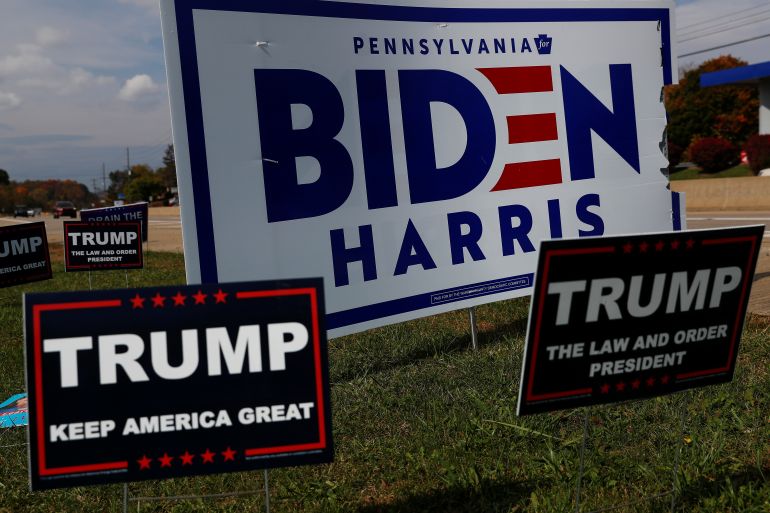
The 2024 presidential race in the United States is heating up, with former President Donald Trump consolidating his hold over the Republican Party and President Joe Biden making his case for four more years in the White House.
Trump outlasted his final major Republican challenger, Nikki Haley, setting the stage for a rematch of the 2020 election, which saw him defeated by Biden.
Keep reading
list of 3 itemsTrump vows to ‘never’ drop out of the 2024 presidential race
Nikki Haley’s Israel advocacy defined her tenure at UN: Advocates
But the former president still must contend with a litany of court cases, throwing a wrench into his campaign plans as the primary season continues. Those state-level contests ultimately determine who receives major party nominations.
Who is running for the Republican nomination? Who is challenging Biden’s re-election bid? What candidates have dropped out of the race?
Here, Al Jazeera looks at the US presidential candidates, their platforms and their chances:
Democratic Party
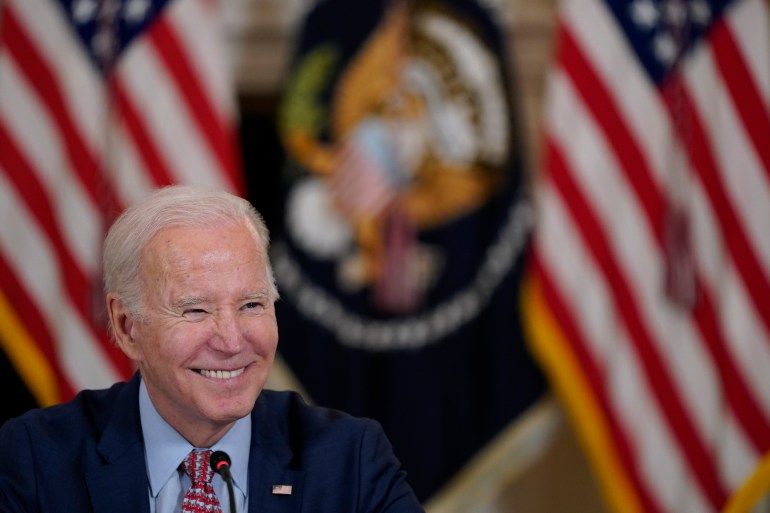
Joe Biden
Biden, who defeated Trump in the 2020 election, appealed to American voters on April 25, 2023, to help him defend democracy and “finish the job” he began in his first term.
“When I ran for president four years ago, I said we’re in a battle for the soul of America. And we still are,” he said in a video formally announcing his re-election campaign. “Let’s finish this job. I know we can,” he said.
An Associated Press-NORC poll released in mid-April showed that about half of Democratic voters wanted Biden to run again, with about 80 percent saying they would support him against a Republican candidate.
But more recent polls have indicated diminishing levels of support. A New York Times poll in November 2023 showed Biden trailing Trump in five key battleground states, a worrying sign in a tight race.
Biden has attracted criticism, particularly from progressives, for his stance toward the Gaza war, after pledging “unwavering” support to Israel and failing to call for a ceasefire.
He has also been hampered by concerns over his age: Biden would be 82 years old at the beginning of his second term if he wins the 2024 election. Some critics have questioned whether he has the stamina to hold the top post for another four years.
But Biden has managed to advance several of his legislative priorities during his first term, including heightened spending to combat climate change and bolster US infrastructure.
The president is widely considered the presumptive Democratic nominee with the party refusing to hold primary debates.
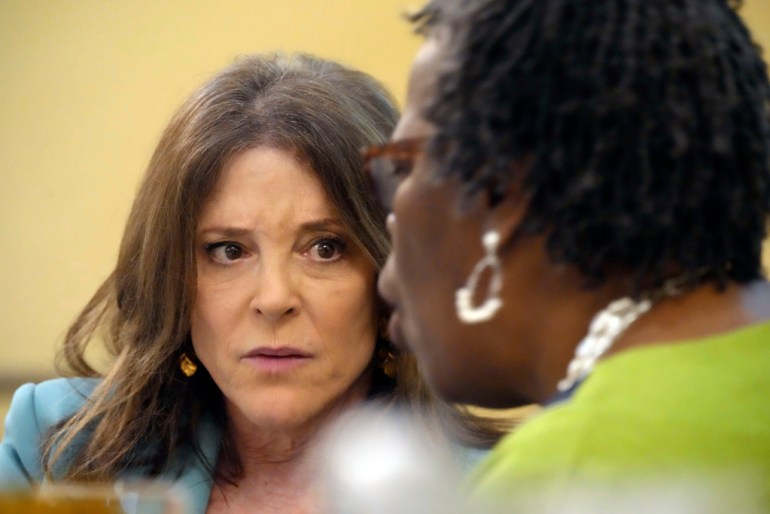
Marianne Williamson
It was a surprise reentry in the race for the Democratic nomination. Just weeks after suspending her campaign, former self-help author Marianne Williamson boomeranged back into the fray, re-launching her bid on February 28, the day after the Michigan primary.
“As of today, I am un-suspending my campaign for the presidency of the United States,” she said in a social media video. “I had suspended it because I was losing the horse race. But something so much more important than the horse race is at stake here. And we must respond.”
In the video, she called Republican frontrunner Trump a “fascist at the door” – but she likewise blasted Biden for the continuing economic disparity in the US.
“We’re talking about millions of voters that can’t even survive unless they work two or three jobs. What is he saying beyond, ‘The economy’s really doing well’?” Williamson said, calling for policies that “expand the economy”.
Her statement came on the heels of primary results that showed her in third place among Democrats in Michigan, with approximately three percent of the vote. Michigan is a key swing state in the general elections.
Williamson, a progressive candidate, previously suspended her campaign in a YouTube video on February 7. She had also run in the 2020 presidential race, appealing to the progressive base of the Democratic Party.
After announcing her most recent bid in March 2023, she called for the preservation of US Social Security retirement benefits, more robust support for labour unions and slavery reparations for Black Americans.
“During the last 50 years, the system has been rigged,” Williamson says on her website.
But media reports indicate her campaign struggled with debt and high staff turnover.
Republican Party
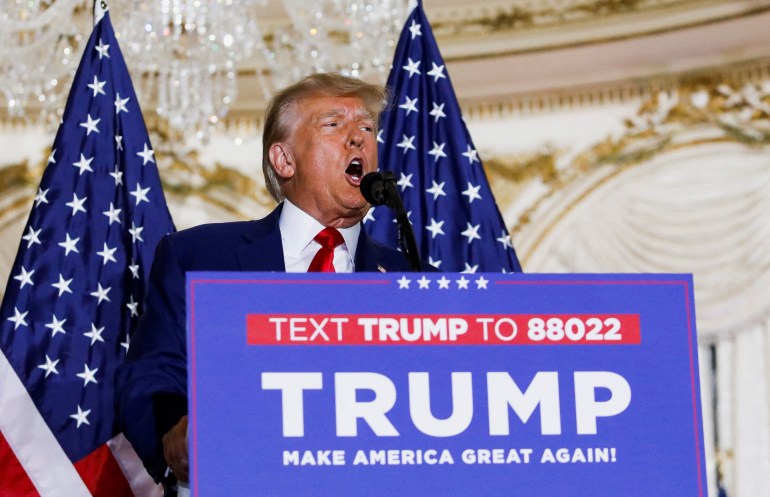
Donald Trump
Trump, who served one term as US president after defeating Democratic candidate Hillary Clinton in 2016, is making another bid for the White House despite mounting legal woes, including four criminal indictments so far in 2023.
The former president — adept at tapping into anger against the US political establishment — holds a wide lead over his rivals for the Republican nomination and still commands widespread influence over the party’s voters.
He has struck a populist tone on topics such as free trade and foreign policy, where he has pursued an “America First” strategy, and has previously leaned into far-right rhetoric on immigrants and Muslims.
During his time as president, however, Trump mostly governed as a traditional Republican, and his signature legislative achievement was a set of tax breaks that largely benefitted the wealthy.
In this campaign, Trump has remained defiant in the face of criminal charges, claiming that prosecutors are trying to derail his bid for the White House.
He skipped the first Republican debate in August, arguing that people know his record. “Why would I Debate? I’M YOUR MAN,” he wrote in a social media post before the event.
Third parties
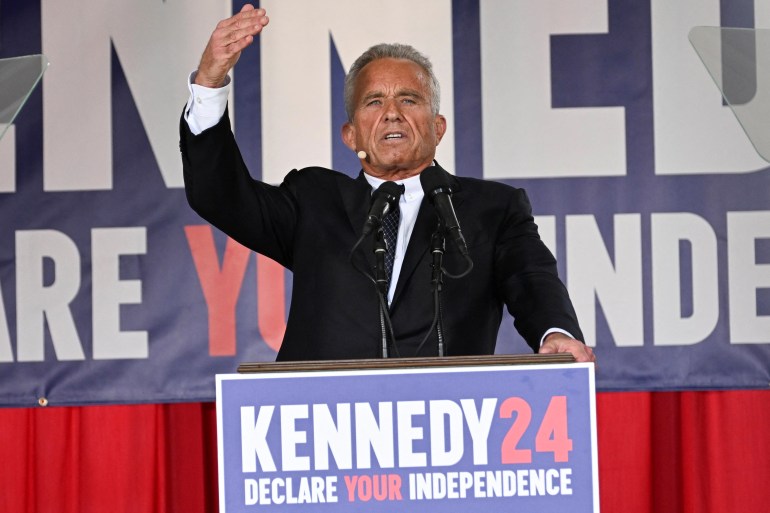
Robert F Kennedy Jr
Kennedy, the nephew of former US President John F Kennedy, formally launched his candidacy in April, initially entering the race as a Democrat.
On October 9, 2023, however, he dropped out of the Democratic primary race, choosing instead to run as an independent.
The son of Robert Kennedy, who was assassinated in 1968 while campaigning for the Democratic presidential nomination, he is a member of one of the most famous families in US politics.
But Kennedy’s campaign has primarily been defined by his prominent role in the anti-vaccine movement. He published a book in 2021 accusing former White House COVID-19 adviser Anthony Fauci of “a historic coup d’etat against Western democracy”.
Kennedy has promised to push back against the “corrupt merger between state and corporate power” if elected. His campaign remains a long shot, though experts say he could draw votes from both Democrats and Republicans.
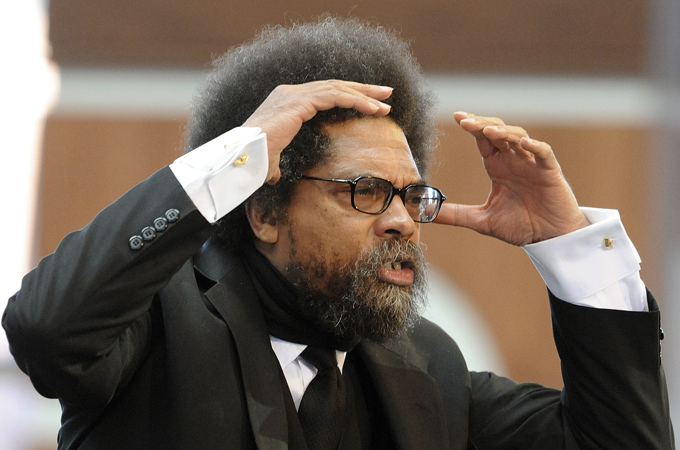
Cornel West
West, a prominent US intellectual and philosopher, said in a tweet on June 5, 2023, that he was running for president as a third-party candidate with the Movement for a People’s Party.
The progressive party was formed in the wake of the 2016 presidential election and had unsuccessfully courted Senator Bernie Sanders as its figurehead.
In his video announcement, West said he had “decided to run for truth and justice, which takes the form of running for president”.
The former Harvard University professor’s platform includes “fighting to end poverty, mass incarceration, ending wars and ecological collapse, [and] guaranteeing housing, health care, education and living wages for all”.
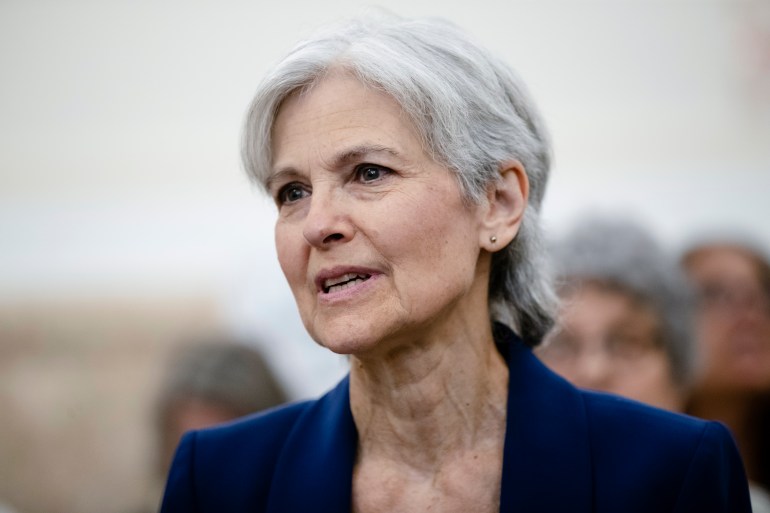
Jill Stein
A physician and activist from Massachusetts, Stein launched her third-party bid for president on November 9, 2023, announcing she would campaign for the Green Party’s nomination.
In an online video announcing her bid, she positioned herself as an alternative to the traditional two-party system.
“The political system is broken. The two Wall Street parties are bought and paid for,” she said, referring to the Democrats and Republicans. “Change won’t come from the ruling elites. It comes from we the people.”
Critics have sometimes blamed Stein, a left-leaning politician, for drawing votes away from Democrats like Hillary Clinton, who lost to Trump in 2016. Stein previously ran in that race as well as in 2012.
She has never held state or national office. Her platform includes a “Green New Deal” to fight climate change and an “economic bill of rights” that includes guarantees for job security, healthcare and housing. She also is an outspoken critic of Israeli Prime Minister Benjamin Netanyahu and has called for an investigation into his government’s actions in Gaza.
Former candidates
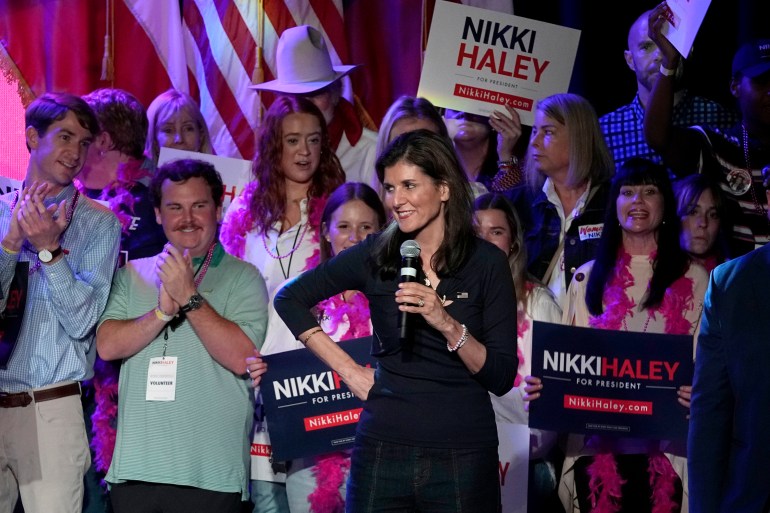
Nikki Haley
The announcement came the morning after March’s Super Tuesday primary races: Haley, a former United Nations ambassador and South Carolina governor, would be suspending her Republican bid for the presidency.
“I said I wanted Americans to have their voices heard. I have done that. I have no regrets,” she said. “Although I will no longer be a candidate, I will not stop using my voice for the things I believe in.”
The suspension came in the aftermath of a brief high point in Haley’s campaign. On Super Tuesday, she won her first state primary in Vermont. The Sunday prior, on March 3, she also notched a rare victory in the Republican primary in Washington, DC.
But those wins came after a series of crushing losses to Republican frontrunner Donald Trump, including in her home state of South Carolina. She had long trailed Trump in the polls.
Yet, her bid was noteworthy as the final major challenge to Trump’s race for the Republican nomination. She outlasted all other major Republican candidates, including early favourite Ron DeSantis.
Haley first announced that she would seek the Republican nomination in February 2023. While she was initially reserved in her criticism of Trump, she increasingly sharpened her rhetoric, questioning Trump’s mental fitness and the “chaos” that accompanies him.
As Washington’s envoy to the UN during the Trump administration, she advocated for taking a confrontational stance towards Iran and was a strong supporter of US allies in the region, notably Israel and Saudi Arabia.
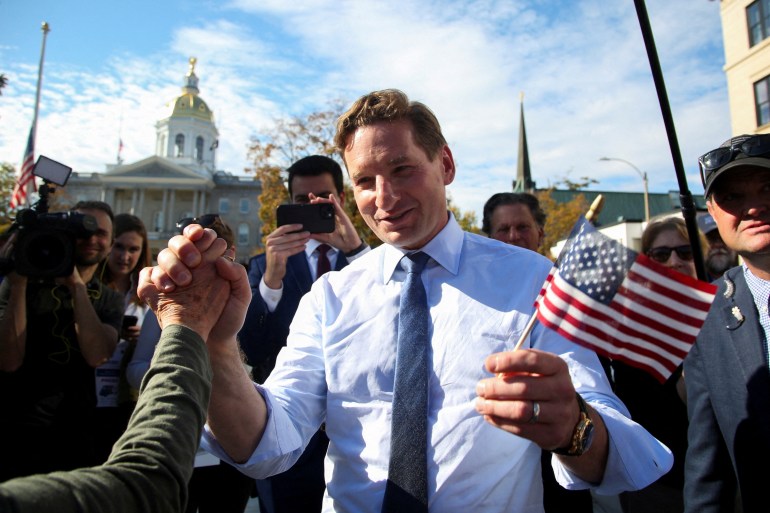
Dean Phillips
A three-term US Representative from a swing district in Minnesota, millionaire businessman Dean Phillips made a surprise entry into the Democratic primary race on October 27, 2023, citing Biden’s poll numbers as a motivation.
“I love Joe Biden. I want to make that clear. I think he saved our country. He was the right man in the last election. Thank goodness he won. But that’s not what the numbers are saying now,” Phillips, the former owner of a gelato company, told CBS News.
But on March 6, the day after the Super Tuesday primary races, Phillips ended his long-shot presidential bid, after failing to make a dent with voters. Instead, he threw his support behind the incumbent president, Democrat Joe Biden.
“I ask you join me in mobilizing, energizing, and doing everything you can to help keep a man of decency and integrity in the White House. That’s Joe Biden,” he wrote on the social media platform X.
He added some gallows humour after his disappointing Super Tuesday results.
“Congratulations to Joe Biden, Uncommitted, Marianne Williamson, and Nikki Haley for demonstrating more appeal to Democratic Party loyalists than me,” he said.
Phillips had loaned his own campaign $2m and pledged to hold 119 town halls across the country as he raced for the Democratic nomination. But early on, his stance towards Israel’s war in Gaza prompted some backlash.
“I just want to hear, before I answer your question, if that empathy is across humanity or only for Palestinians right now?” Phillips said in a tense exchange with an audience member who asked about a ceasefire at a New Hampshire town hall.
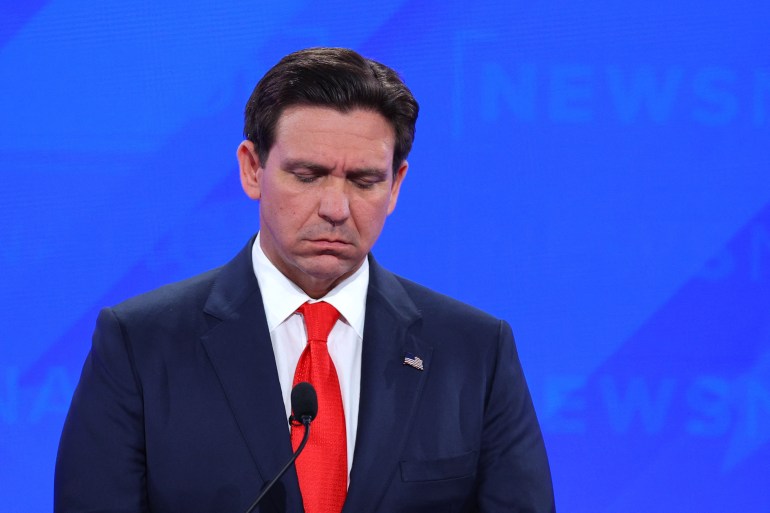
Ron DeSantis
With only two days until the New Hampshire primary — the first primary race in the 2024 presidential election cycle — Florida Governor Ron DeSantis made an announcement that caught his supporters off guard: He was suspending his campaign for the Republican nomination.
It was an abrupt end to a presidential run that pundits once predicted would challenge Trump’s hold over the Republican Party.
Despite that early buzz, DeSantis’s campaign failed to find its footing. Even his online campaign launch on May 24, 2023, was marked by a string of glitches that prompted jokes and questions about the efficacy of his campaign.
For much of his time in the race, DeSantis occupied second place — though he trailed Trump by seemingly insurmountable margins.
He earned 21 percent of the votes in January’s Iowa caucuses, behind Trump’s 51 percent. Less than a week later, he bowed out of the race, throwing his support behind the former president.
“Following our second-place finish in Iowa, we’ve prayed and deliberated on the way forward,” he said on the social media platform X on January 21.
“If there was anything I could do to produce a favourable outcome — more campaign stops, more interviews — I would do it. But I can’t ask our supporters to volunteer their time and donate their resources if we don’t have a clear path to victory.”
DeSantis used his work in Florida as a “blueprint” for his presidential platform, promising to bring the state’s abortion restrictions and education changes to the national level. He has sought to limit discussion of race, sexual orientation and gender in classrooms, in favour of expanding “parental rights” in schools.
He has also been dismissive of the war in Ukraine, calling it a “territorial dispute”.
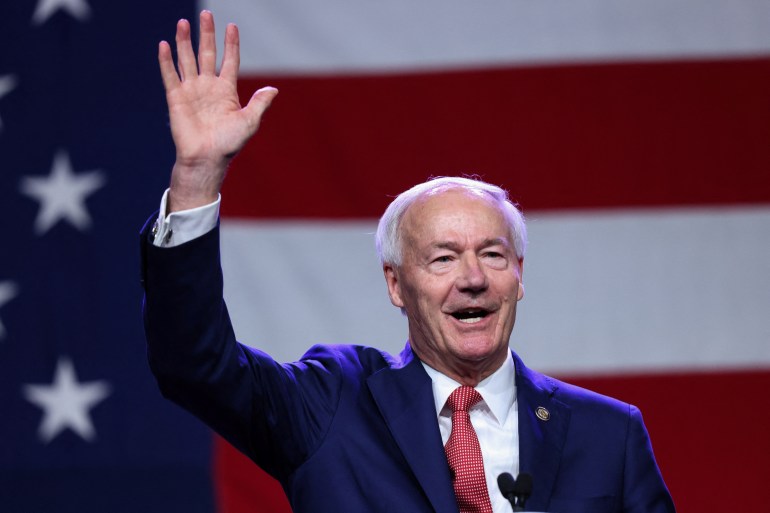
Asa Hutchinson
Hutchinson, a former governor of Arkansas, suspended his campaign for the Republican nomination the morning after the Iowa caucuses.
It was a muted end for one of the final outspoken Trump critics in the Republican field: Hutchinson placed sixth in the caucuses, well behind his remaining rivals.
In his parting message, Hutchinson seemingly took a dig at the primary process. “My message of being a principled Republican with experience and telling the truth about the current front runner did not sell in Iowa,” he wrote in a statement.
Hutchinson launched his campaign on April 26, 2023. He previously served as a US congressman and as undersecretary in the Department of Homeland Security during the tenure of former President George W Bush.
While he qualified for the first Republican primary debate, he fell short of the poll numbers needed to appear at any subsequent one.
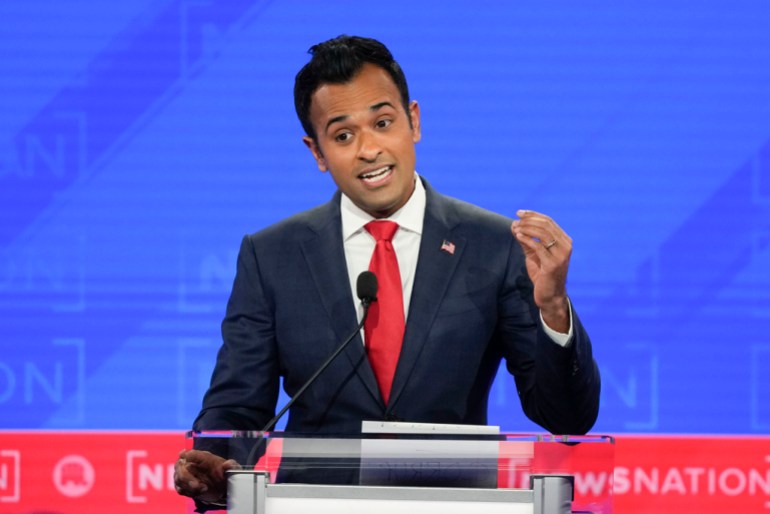
Vivek Ramaswamy
On January 15, after a disappointing fourth-place finish in the Iowa caucuses, author and entrepreneur Ramaswamy dropped out of the race for the Republican presidential nomination.
“There’s no path for me to be the next president, absent things that we don’t want to see happen in this country,” Ramaswamy told supporters gathered in a Des Moines hotel. He instead threw his support behind Trump.
Ramaswamy entered the presidential race as a relatively unknown candidate in February 2023. Despite having no previous political experience, he built a reputation as a crusader against “wokeism”, a term that conservative pundits use to refer to social justice movements.
Ramaswamy was born in the state of Ohio and graduated from Yale Law School before going to work at a hedge fund and starting a pharmaceutical company.
He received a flood of attention after the first Republican presidential debate on August 23, 2023, during which he was a frequent target of attacks by his rivals, including over his proposal to no longer provide military aid to Ukraine.
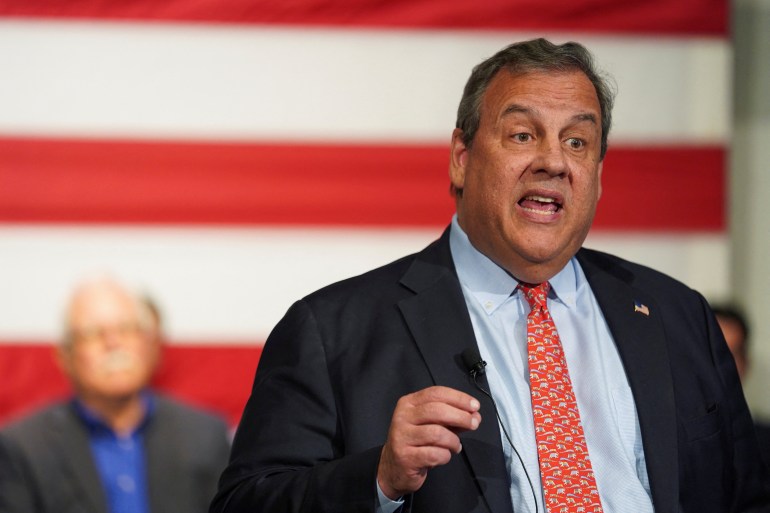
Chris Christie
Christie, a former New Jersey governor, made a fiery exit from the Republican race on January 10, just hours ahead of a primary debate and a Trump town hall.
With only days until the Iowa caucuses, Christie, a long-shot candidate, had been under pressure to drop out and throw his support behind fellow Republican Haley.
Christie had long positioned himself as the foremost Trump critic in the Republican field. But his election prospects were dim, and critics had accused him of siphoning votes away from other Trump alternatives like Haley.
Christie ultimately took the stage in Windham, New Hampshire — a state he invested much of his campaign in — to announce his withdrawal from the race.
“It’s clear to me tonight that there isn’t a path for me to win the nomination,” he told the crowd.
But he declined to endorse any of his Republican rivals in his exit speech, which was itself upstaged by unscripted comments caught on a hot mic ahead of the speech’s livestream.
In those remarks, Christie said Haley “was going to get smoked” in the election, and he described DeSantis as “petrified” — delivering an inadvertent boost to the Trump campaign.
Christie had filed paperwork to declare his candidacy on June 6, 2023. He previously ran in the 2016 presidential race, ultimately bowing out and throwing his support behind Trump. But the two Republican leaders ultimately had a falling-out, leading Christie to emerge as one of Trump’s most vocal critics within the party.

Doug Burgum
On December 4, 2023, just two days ahead of the fourth Republican primary debate, Burgum — a former software executive and current governor of North Dakota — announced an end to his long-shot bid.
In his departure statement, Burgum took a parting shot at US politics and the media landscape.
“While this primary process has shaken my trust in many media organizations and political party institutions, it has only strengthened my trust in America,” he wrote.
Burgum initially launched his presidential bid in the pages of the Wall Street Journal, with a June 2023 opinion article.
A multimillionaire, he later kept his campaign afloat with a strategy of offering gift cards in exchange for campaign donations — a scheme that allowed him to meet the minimum number of donors to qualify for the first two Republican debates.
He failed to meet the national polling threshold for the third debate, however.
Burgum had also sought to portray his relatively low national profile as a strength, saying he was far removed from the bitter war of words of the more prominent candidates.
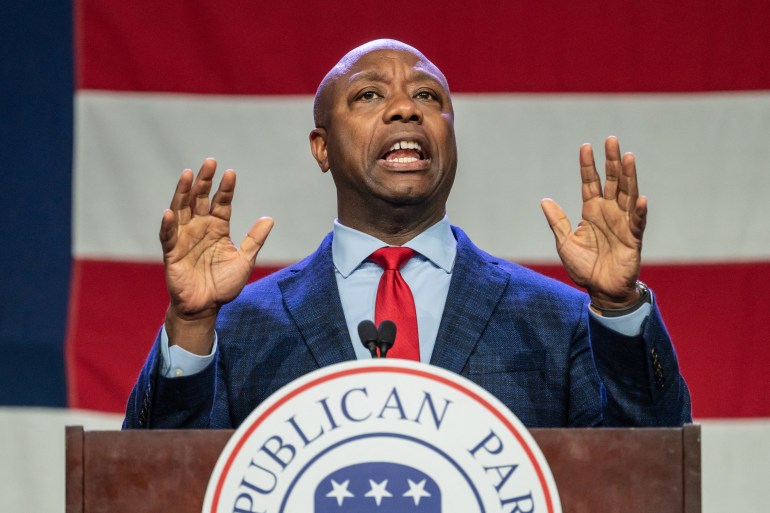
Tim Scott
On November 12, 2023, Scott appeared on Fox News to announce he would no longer be running for president in the 2024 cycle.
“I think the voters — who are the most remarkable people on the planet — have been really clear that they’re telling me, ‘Not now, Tim,'” he said on the TV programme Sunday Night in America.
A Republican senator from South Carolina, Scott officially launched his campaign in May, promising a “revolution for excellence” in the country’s education system. He declined to endorse another candidate in the hours after ending his run.
Scott, like his colleagues in the Republican field, trailed frontrunner Trump by significant margins, and critics said his campaign’s positive messaging failed to resonate with voters.
Scott, who is the only Black Republican in the Senate, often highlighted his own humble beginnings as evidence that the US is “the land of opportunity and not a land of oppression”, dismissing claims of systemic racism.

Mike Pence
Pence, who served as Trump’s vice president, made a surprise exit from the race on October 28, 2023, as he addressed the Republican Jewish Coalition in Las Vegas, Nevada.
“It’s become clear to me: This is not my time,” he told the coalition’s annual meeting. “So after much prayer and deliberation, I have decided to suspend my campaign for president effective today.”
At the time of his departure, Pence was the highest-profile candidate to end his campaign for the Republican nomination. But he had long trailed Trump, his former boss with whom he had a falling-out after the attack on the US Capitol on January 6, 2021.
Pence has accused Trump of having “endangered” his family with his “reckless words”, including his unsubstantiated claims that the 2020 elections were fraudulent. Trump allegedly pressured Pence and other politicians to overturn the outcome of that vote.
Since their schism, Pence has tried to establish himself as a principled alternative to Trump: a candidate who would be guided by his Christian faith.
During his campaign, he distinguished himself as the only prominent candidate to back a nationwide abortion ban at six weeks of pregnancy, and he pledged to take the abortion pill mifepristone off the market to “protect the unborn”.
He has also set himself apart by vocally supporting US aid to Ukraine.
Pence had formally declared his candidacy for president in June 2023. He previously served as Indiana governor and a member of the US House of Representatives.
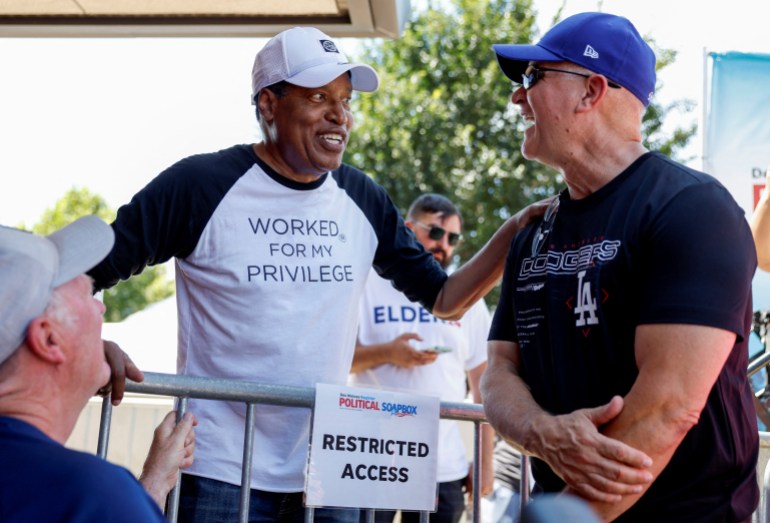
Larry Elder
A conservative talk radio host, Elder ended his campaign for the Republican nomination on October 26, 2023, throwing his support behind Donald Trump instead.
“We must unite behind Donald Trump to beat Joe Biden and fight back against Biden’s unprecedented election interference,” Elder wrote in a post on social media, referencing false claims that the 2020 election was “stolen” from Trump.
Elder failed to make waves in his bid for the presidency, falling short of the requirements needed to participate in the first two Republican primary debates. He and fellow candidate Perry Johnson pledged to sue the Republican National Committee over their exclusion.
Elder announced his run for the presidency on April 20, 2023. Previously, he was best known for challenging California’s Democratic Governor Gavin Newsom in a recall vote in 2021.
Newsom easily beat back that recall attempt, which failed by a margin of about 62 to 38 percent.
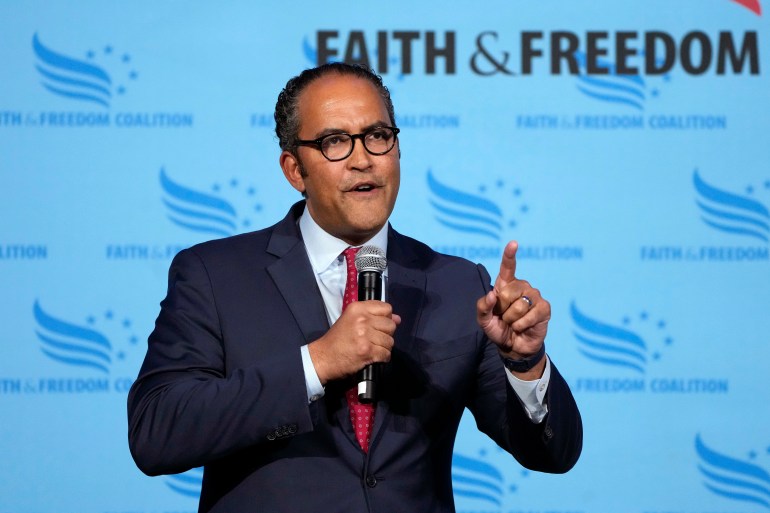
Will Hurd
Hurd, a former US congressman from Texas, suspended his campaign for the Republican nomination on October 9, 2023, throwing his support instead behind Haley’s bid.
A former US congressman from Texas, Hurd exited the race much as he entered it: with harsh words for Republican frontrunner Trump.
“If the Republican party nominates Donald Trump or the various personalities jockeying to imitate his divisive, crass behavior, we will lose,” he wrote on the social media platform X.
An undercover CIA officer before his political career, he has said Republicans need “to articulate a different vision” than that of “a lawless, selfish, failed politician” like Trump.
Since entering the race in June 2023, Hurd failed to garner much support, making him ineligible to participate in the first two Republican primary debates.
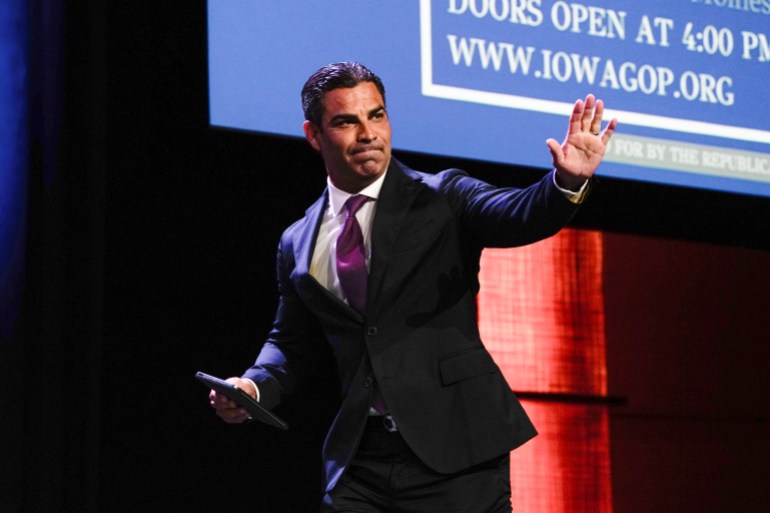
Francis Suarez
Suarez, the mayor of Miami, Florida, became the first major candidate to drop out of the race on August 29, 2023, just days after he failed to qualify for the first Republican debate.
The son of Miami’s first Cuban-born mayor, Suarez was one of three Republican hopefuls from Florida, alongside Trump and DeSantis, both of whom he criticised. He was also a champion of cryptocurrency and other tech ventures.
His campaign may be best remembered for a radio interview in which Suarez asked, “What is a Uighur?” when discussing his position on China.
This article was last updated on March 6, 2024.